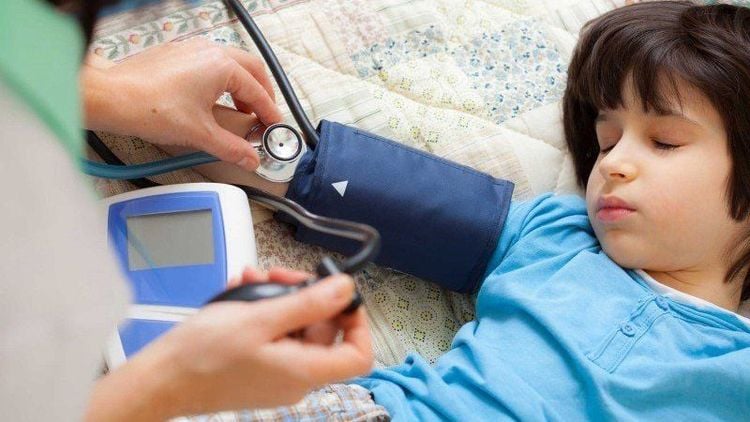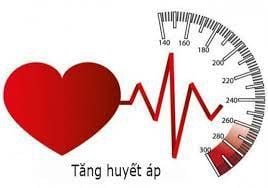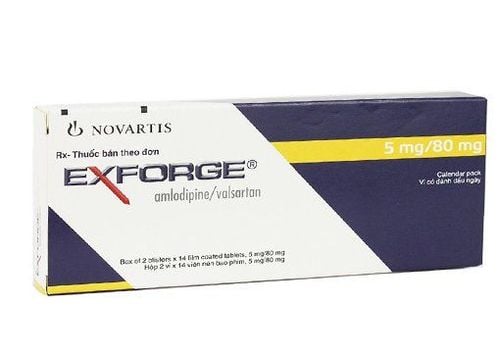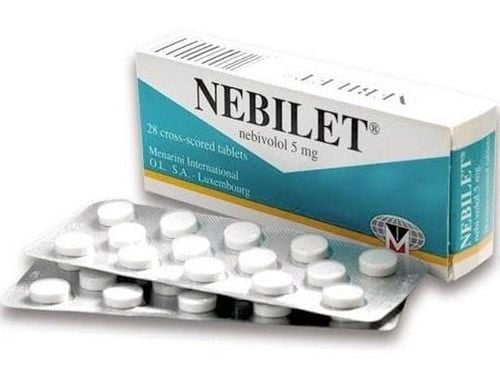This is an automatically translated article.
The article was professionally consulted by Specialist Doctor II Le Thanh Cam - Department of Pediatrics - Neonatology, Vinmec Da Nang International General Hospital.Pediatric hypertension is a condition in which a child's measured normal blood pressure is consistently higher than the normal range in 95% of children of the same age, sex, and height. Most hypertension in children has a cause and is often the result of another disease such as the heart, kidneys, brain...
1. Diagnosis of high blood pressure in children
Hypertension in children is one of the cardiovascular diseases of great interest in children and has been identified as a risk factor for hypertension and other cardiovascular diseases in adulthood. The increasing prevalence of obesity and sedentary lifestyle in children has resulted in increased prevalence of hypertension in children.Accordingly, the method of diagnosing hypertension in children is based on age, sex and height with the 50th, 90th, 95th, 99th percentiles of systolic and diastolic blood pressure.
Normal blood pressure: systolic and diastolic blood pressure < 90th percentile for age, sex and height. Normal – high blood pressure (considered prehypertension): mean systolic and/or mean diastolic blood pressure ≥ 90th but < 95th percentile; ≥ 120/80 mmHg and < 95th percentile in older children and adolescents. Hypertension: mean systolic and/or mean diastolic blood pressure ≥ 95th percentile for age, sex, and height on at least 3 different measurements. White coat hypertension: Blood pressure value ≥ 95th percentile in hospital/clinic but <90th percentile outside hospital.
2. Complications of high blood pressure in children

Left ventricular hypertrophy Left ventricular hypertrophy is the clearest and most common evidence of damage in hypertension in children. When a child's blood pressure is above the 95th percentile for age, sex and height are the thresholds that are strongly associated with left ventricular hypertrophy. Thus, left ventricular hypertrophy can occur early in childhood and needs to be detected early once hypertension is diagnosed.
Vascular and retinal damage Vascular ultrasound can find changes in the structure and function of the vascular system that are associated with hypertension.
Children with hypertension have also reported an association with retinal vascular disease. The frequency of hypertensive retinal abnormalities in children occurs in about 50% of cases, but after stabilization of hypertension these abnormalities disappear.
Neurological complications Neurological complications in hypertension in children often occur in severe hypertension with manifestations of hypertensive encephalopathy, cerebrovascular accident, convulsions, hemiplegia. The prognosis of hypertensive encephalopathy in children is relatively better than in adults if detected and treated promptly.
Stroke, kidney failure If high blood pressure persists into adulthood, children may be at increased risk for conditions such as stroke, heart attack, heart failure and kidney disease.
3. Treatment of high blood pressure in children
Thera enlarged. Preventing excess weight will limit the risk of developing high blood pressure. Should direct children to participate in fun, outdoor activities, exercise, encourage children to be active and love, passion, and practice certain sports. Limit children sitting too long in front of the computer screen, watching TV, playing games,... Ensure a balanced and scientific diet. Children's daily diet needs to be calculated with appropriate, scientific and balanced nutrients and nutrients. Children should limit eating foods with a lot of sugar, fat, salt, fast foods, sugary drinks. Along with that is to increase the diet high in fiber, fruits, green vegetables. Children can also be stressed when the pressure to study is too great, psychological stress and fatigue from parents, friends, family... Which is also the cause of increased risk of high blood pressure, in both adults and children. So, help your child deal with stress.
When a child has high blood pressure, parents should control it by following the doctor's instructions carefully; Teach your child a healthy lifestyle and make sure your child's blood pressure is checked regularly as recommended by your doctor so you can help your child control high blood pressure and let them enjoy a healthy life. strong.
As a key area of Vinmec Health system, Pediatrics Department always brings satisfaction to customers and is highly appreciated by industry experts with:
Gathering a team of top doctors and nurses in Pediatrics : consists of leading experts with high professional qualifications (professors, associate professors, doctorates, masters), experienced, worked at major hospitals such as Bach Mai, 108.. Doctors All doctors are well-trained, professional, conscientious, knowledgeable about young psychology. In addition to domestic pediatric specialists, the Department of Pediatrics also has the participation of foreign experts (Japan, Singapore, Australia, USA) who are always pioneers in applying the latest and most effective treatment regimens. . Comprehensive services: In the field of Pediatrics, Vinmec provides a series of continuous medical examination and treatment services from Newborn to Pediatric and Vaccine,... according to international standards to help parents take care of their baby's health from birth to childhood. from birth to adulthood Specialized techniques: Vinmec has successfully deployed many specialized techniques to make the treatment of difficult diseases in Pediatrics more effective: neurosurgery - skull surgery, stem cell transplantation. blood in cancer treatment. Professional care: In addition to understanding children's psychology, Vinmec also pays special attention to the children's play space, helping them to have fun and get used to the hospital's environment, cooperate in treatment, improve the efficiency of medical treatment.
Please dial HOTLINE for more information or register for an appointment HERE. Download MyVinmec app to make appointments faster and to manage your bookings easily.














